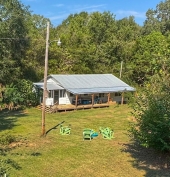
 19
19




AgroVentures Peru - https://agroventuresperu.com/ *Youtube channel* https://www.youtube.com/channel/UCE5p3KK5cLv9SSS_4QgH_jw
My book, Alternative Crops for Drylands - https://www.etsy.com/listing/820577513/alternative-crops-for or https://www.amazon.com/gp/product/0988282208
 8
8




Scott Obar wrote:I'm a bit discouraged as I go on youtube and see homesteading/permaculture farm channels, and it seems everyone also has some sort of job (usually digital-related, but sometimes a defacto job in town), a wealthy spouse, or they are making their income from youtube, or from hosting workshops, airbnbs etc.
Where are all the examples of people raking in the dough from straight-up farm products? Let's learn from those examples please!
Otherwise, it's not a very good testimonial of permaculture/modern small-scale farming/ homesteading.
AgroVentures Peru - https://agroventuresperu.com/ *Youtube channel* https://www.youtube.com/channel/UCE5p3KK5cLv9SSS_4QgH_jw
My book, Alternative Crops for Drylands - https://www.etsy.com/listing/820577513/alternative-crops-for or https://www.amazon.com/gp/product/0988282208
 3
3




I make a Maple Syrup instructional movie! Check it out HERE
SKIP books, get 'em while they're hot!!! Skills to Inherit Property
See me in a movie building a massive wood staircase:Low Tech Lab Movie
 16
16




Visit Redhawk's soil series: https://permies.com/wiki/redhawk-soil
How permies.com works: https://permies.com/wiki/34193/permies-works-links-threads
 4
4




Scott said, "Is it even realistic for one or two people to be able to pull off this sort of operation on their own,
Invasive plants are Earth's way of insisting we notice her medicines. Stephen Herrod Buhner
Everyone learns what works by learning what doesn't work. Stephen Herrod Buhner
 4
4




Jay Angler wrote:And the bad news is... farms such as you're imagining Scott are having to compete with farms that are either subsidized or are destroying the soil or have at least one family member working off farm subsidizing the farm debt or all three. Cheap food - and specifically the expectation of cheap food - has been part of our mindset ever since some guy promised, "a chicken in every pot".
I'm happy to get more farms at least protecting and building their soil, producing nutritionally dense food, and treating their animals humanely even if it has to be done in a subsidized manner. I do believe we may get there. A webinar I watched recently was with authors of a book which isn't out yet, "What Your Food Ate: How to Heal Our Land and Reclaim Our Health". There's long been a belief that "organic" farming (let alone better than organic) can't "feed the world" and the authors challenge that belief and are doing research to prove it. There book may have the names of farms that would fit your description, but again, so many rely on woofers or similar (although some people I know claim woofers often are more trouble than they're worth).
Small farms used to just feed the farmers and their community. A *huge* percentage of our population used to be involved in growing food 100 years ago, compared to a very small percentage now. And yet, modern farmers want the standard of living society says is required to be happy. Most of them are in debt due to the system despite off-farm income.
So part of the question may need to be, "How do we define "Economic Success"?
AgroVentures Peru - https://agroventuresperu.com/ *Youtube channel* https://www.youtube.com/channel/UCE5p3KK5cLv9SSS_4QgH_jw
My book, Alternative Crops for Drylands - https://www.etsy.com/listing/820577513/alternative-crops-for or https://www.amazon.com/gp/product/0988282208
 9
9




(Reminder to myself) God didn't say, "well said, well planned, and well thought out." He said, "well done."
Nikki's Wishlist
 8
8




Nikki Roche wrote:I've skimmed through some books at my library that highlight farms who seem to fit what you're after. I don't remember the names of the books nor the farms, as I wasn't at a point to do much with the information at the time. But they helped me see that some do exist.
YouTube isn't geared toward the farms that you're looking for. YouTube is often either an advertising tool to bring people to their other products, or it's to bring money directly from the videos. Unless video editing is a favorite hobby, there's not much point in taking time to craft good videos if they're not going to bring in income somehow. At least there wouldn't be for me.
AgroVentures Peru - https://agroventuresperu.com/ *Youtube channel* https://www.youtube.com/channel/UCE5p3KK5cLv9SSS_4QgH_jw
My book, Alternative Crops for Drylands - https://www.etsy.com/listing/820577513/alternative-crops-for or https://www.amazon.com/gp/product/0988282208
 13
13




John Daley Bendigo, Australia The Enemy of progress is the hope of a perfect plan
Benefits of rainfall collection https://permies.com/t/88043/benefits-rainfall-collection
GOOD DEBT/ BAD DEBT https://permies.com/t/179218/mortgages-good-debt-bad-debt
 3
3




Jay Angler wrote:And the bad news is... farms such as you're imagining Scott are having to compete with farms that are either subsidized or are destroying the soil or have at least one family member working off farm subsidizing the farm debt or all three. Cheap food - and specifically the expectation of cheap food - has been part of our mindset ever since some guy promised, "a chicken in every pot".
Come join me at www.peacockorchard.com
 2
2




If there is one thing the Wizard of Oz has taught me, it is not to trust school teachers on bicycles.
 14
14




Pecan Media: food forestry and forest garden ebooks
Now available: The Native Persimmon (centennial edition)
 17
17





 3
3




Tradition is not the worship of ashes, but the preservation of fire.
 11
11




When you reach your lowest point, you are open to the greatest change.
-Avatar Aang
 4
4




Living a life that requires no vacation.
 15
15




 13
13




 12
12




 3
3




Scott Obar wrote:There should be more examples of people making ends meet purely from the farming aspect of their operation ....
GreenHeart Education ... Greening the heart of teaching, one teacher at a time
Check out my school garden pages ... www.greenhearted.org
 4
4




 9
9




Scott Obar wrote:
There should be more examples of people making ends meet purely from the farming aspect of their operation, not from tours, information products, farm tours, airbnbs, youtube clicks, a spouse's job, etc.
Otherwise, it's not a very good testimonial of permaculture/modern small-scale farming/ homesteading.
Julie Johnston says:
I want to believe that permaculture can "save the world," but a) we really need to ramp up its adoption and implementation, and b) how do we grow enough food using permaculture ethics, principles and techniques to feed the world population that has grown increasingly used to cheap / subsidized but carbon-intensive corn, soy, rice and meat, etc. -- while also giving the farmer/s a decent income?
https://againfarmstead.com/ | @againandagainfarmstead
 5
5




Check out Redhawk's soil series: https://permies.com/wiki/redhawk-soil
 2
2




 10
10




Heal the land. Heal the water. Heal the people.
 9
9




 1
1




John Daley Bendigo, Australia The Enemy of progress is the hope of a perfect plan
Benefits of rainfall collection https://permies.com/t/88043/benefits-rainfall-collection
GOOD DEBT/ BAD DEBT https://permies.com/t/179218/mortgages-good-debt-bad-debt
 4
4




John Daley Bendigo, Australia The Enemy of progress is the hope of a perfect plan
Benefits of rainfall collection https://permies.com/t/88043/benefits-rainfall-collection
GOOD DEBT/ BAD DEBT https://permies.com/t/179218/mortgages-good-debt-bad-debt




Check out Redhawk's soil series: https://permies.com/wiki/redhawk-soil
 3
3




John Suavecito wrote:Syntropic agriculture sounds a lot like permaculture.
John S
PDX OR
 6
6




Scott Obar wrote:I'm a bit discouraged as I go on youtube and see homesteading/permaculture farm channels, and it seems everyone also has some sort of job (usually digital-related, but sometimes a defacto job in town), a wealthy spouse, or they are making their income from youtube, or from hosting workshops, airbnbs etc.
 2
2




Check out Redhawk's soil series: https://permies.com/wiki/redhawk-soil
 2
2




 1
1




 1
1




Check out Redhawk's soil series: https://permies.com/wiki/redhawk-soil
 5
5




"When the whole world is running towards a cliff, he who is running in the opposite direction appears to have lost his mind." C.S. Lewis
Visit https://themaineingredient.com for organic, premium dried culinary herbs that are grown, processed, and packaged in the USA.
 4
4




Skot Colacicco wrote:
Business first, Farmer second. Anything else is called Gardening.
 5
5




This is all just my opinion based on a flawed memory

 3
3




Scott Obar wrote:I'm a bit discouraged as I go on youtube and see homesteading/permaculture farm channels, and it seems everyone also has some sort of job (usually digital-related, but sometimes a defacto job in town), a wealthy spouse, or they are making their income from youtube, or from hosting workshops, airbnbs etc.
Where are all the examples of people raking in the dough from straight-up farm products? Let's learn from those examples please!
Why so few examples where people are getting into the nitty gritty of the economic aspects of their operation?
pax amor et lepos in iocando




John Daley Bendigo, Australia The Enemy of progress is the hope of a perfect plan
Benefits of rainfall collection https://permies.com/t/88043/benefits-rainfall-collection
GOOD DEBT/ BAD DEBT https://permies.com/t/179218/mortgages-good-debt-bad-debt







